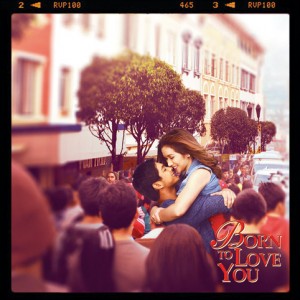Jerome Pobocan’s new rom-com, “Born to Love U,” set a daunting goal for itself: Help make an overnight actress and star out of singer Angeline Quinto. Against all odds, it required the young and raw acting talent to do both broad, for-the-fans comedy and “deep” drama, the better to firmly establish, not just her commercial appeal, but also her dramatic chops.
We’re all for artistic gumption and for daring to go where angels fear to tread, but after viewing Pobocan’s movie, we had to note that those angels had reasons to be timorous, and very afraid. Despite the actress and her director’s best efforts to whip her into good acting shape, she fell short of the mark for promising new stars.
Her portrayal was earnest enough, but there was a hinog sa pilit feel to it.
It’s also pertinent to note that the fault was not entirely or even principally Angeline’s, or her costar Coco Martin’s. We’re focusing on their acting mark in this movie in other pieces, but we’re reviewing the film as a whole here, to provide a clarifying context to our subsequent observations and analyses.
** *
Core of the plot
At the core of the movie’s main plot and central theme is Coco’s character’s raging anger at his mother (Eula Valdez) for leaving him and his father for a richer man (Albert Martinez). It makes him shun deep intimacy and love for others, and causes him to live mainly for himself.
When Angeline first meets him, they don’t hit it off (that’s par for the predictable rom-com course). But, of course, they eventually do fall in love despite his monumental hang-ups and deep resentments—again, mainly due to Angeline’s “think positive” efforts.
Thus, the film shapes up as a dramatized discussion of the theme of emotional accessibility and commitment, as exemplified by its leads, who are polar opposites when it comes to openness. She’s also been hit by life’s low blows, but she’s chosen to always look at the brighter side.
To our mind, that’s a valid and potentially fruitful theme for a feature film—but the production soon compromises its clarifying focus and dynamic energy by playing it safe and overloading its development with the usual plot twists for their own sake, kilig and pa-cute scenes “for the fans,” and standard touches like her tripping and falling into his arms, etc.
The second half of the movie is particularly problematic, because this is where its key conflicts have to be resolved. Unfortunately, the all-important recrimination scene between mother and son isn’t pulled off well and deeply enough by all parties involved.
As for the lovebirds’ own conflict, it’s awkwardly sidestepped by having something really dire happen to him, so the film’s denouement is skittishly achieved.
Controversial point
Another problem appears to be the fact that director Pobocan comes from the TV drama and teleserye scene, which could explain this movie production’s relative smallness of context and vision.
We know that this is a controversial point to make, but it could help explain why this movie has so many scenes involving just its two leads, and why the context of their central conflict is less than clarifyingly established, and achieved.
On the plus side, the film features an excitingly rendered scene in which the two leads are almost run over by a speeding train, which teaches them— and us—a vital lesson about the
need for trust in order for love to thrive. Alas, there aren’t enough such telling scenes to affirm the production’s insights and pertinent visual brilliance.
***
We wonder why “Born to Love U” opted to make relatively minimal use of Angeline’s proven singing talent. Is that full exposure being reserved for another all-singing showcase?
In any case, it robbed her launching movie of one of her proven strengths precisely when she needed all the help she could get, so it appears to have been a foolhardy nongambit.


